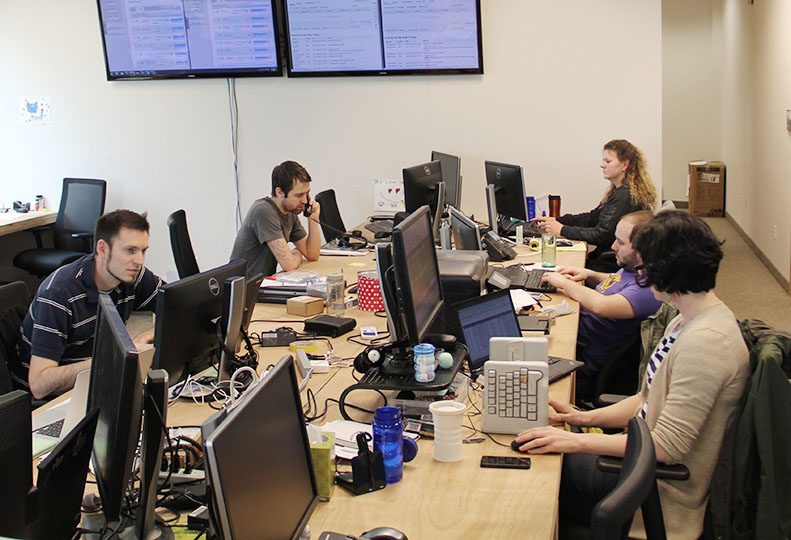
Home » Liberty Lake-based cloud computing company's growth skyrockets
Liberty Lake-based cloud computing company's growth skyrockets
Watch reports 400 percent growth in annual revenue, nears 100 workers

April 10, 2014
2nd Watch Inc., a Liberty Lake-based cloud computing company and provider of Amazon Web Services, saw revenue growth of 400 percent in 2013 over 2012 and is on track to hit triple-digit percentage growth again this year, says CEO Kris Bliesner.
Bliesner attributes the growth partially to the boom in the cloud computing market within the tech industry, he says.
“The market as a whole is growing quite rapidly,” he says. “Depending on who you talk to, what industry analysts, the cloud market is growing anywhere from 40 to 50 percent compound growth rate (annually).”
Spending on public network cloud information-technology services is expected to rise from $47.4 billion last year to more than $107 billion in 2017, according to data from International Data Corp. published in a November 2013 Forbes article. The article also cited an estimate from a report by IT research company Gartner Inc. that enterprises could spend $921 billion on public cloud services in the next five years.
The term cloud refers to remote servers used to store, manage, and process data, as opposed to local, on-premises servers or computers. Cloud computing service is a utility service that’s available on demand and gives clients access to expertly managed technology resources.
Bliesner says companies with IT needs are beginning to realize the advantages to using a cloud-based system rather than a hardware-based system.
“What I think we’re seeing in the market in general is people are starting to latch on to the value of cloud computing,” he says. He also says that 2nd Watch, which is approaching 100 employees total and has about 55 in Liberty Lake, in particular works with its clients to show them the advantages of using cloud computing.
The company, located at 2310 N. Molter in Liberty Lake, also has offices in Seattle, New York, and Atlanta, Bliesner says, as well as sales representatives scattered in other states.
2nd Watch was selected recently by TicketsWest, part of the entertainment division of Red Lion Hotels Corp., to migrate its content management system to cloud-based service. By using the cloud, Bliesner says, TicketsWest can scale its online infrastructure based on the amount of Web traffic it’s expecting for a particular event. If TicketsWest is selling tickets for an event that it knows is going to be popular, for example, its website must be able to handle the high volume of users who may be rushing to purchase tickets.
“You can imagine that during high-volume events, things come in hot and heavy,” Bliesner says. “They don’t have any down time. From an IT perspective, you have to have a big infrastructure to manage the usage.”
Instead of paying for an additional Web server to handle the website traffic, Bliesner says, TicketsWest will be able to scale the capacity of its website by the hour, using the cloud.
“If they have these usage spikes, they can add capacity by the hour, not pay thousands of dollars for an extra server,” he says.
Bliesner says that 2nd Watch also is security conscious while providing service to TicketsWest. This is important, he says, because the company sells its tickets entirely online.
“They’re very concerned about high availability and security,” he says. “You can’t just show up at the retail store and buy tickets. It’s really crucial that we have the high security to support them.”
Companies pay for cloud-based services in a few different ways, Bliesner says. One way is for the company to be billed at the end of the month for how much the company uses the cloud service. There’s also different pricing schemes for companies that commit up front to using the service over the course of a year or more, he says. Bliesner declines to say how and how much 2nd Watch is charging TicketsWest for the cloud computing services it needs.
Late last year, 2nd Watch received $23 million from venture capitalists, which the company has used to support its growth and hire more employees, Bliesner says. In 2012, the company had about 15 employees; by the end of 2013, it had 75, and it’s now nearing 100, he says.
“It was really about how we continue to fuel the growth we’ve been having,” Bliesner says. “We’re able to use that capital to continue to grow and look for new and innovative solutions in the industry.”
There are significant advantages to using cloud servers over traditional IT equipment, Bliesner asserts, with the main advantages being saving money and time.
“If you think about data centers or IT infrastructure, these things are pretty expensive,” he says. “You have to buy servers and you have to put them somewhere.”
Companies often will lease space in data centers for their servers, Bliesner says. With cloud computing, however, the company doesn’t have to purchase an expensive piece of equipment or pay to house it, he says.
“It can be cheaper than what it costs to rent the empty rack at a data center,” he says. “We typically see customers save 40 to 50 percent on the low end, up to 60, 70, even over 80 percent cost savings over traditional data center infrastructure.”
Using a cloud-based system saves a company time when it wants to deploy a new online campaign or service. “The agility component, that’s something a lot of people miss,” Bliesner says. “It takes a lot of time to deploy and manage IT infrastructure. If you’re in business that means you’re waiting.”
Bliesner says cloud-based services also cut down on waste by customers only having to pay for what they use.
“In the cloud world, it’s literally a pay-for-service model,” he says. “You just pay for what you use.”
Latest News Technology
Related Articles
Related Products




